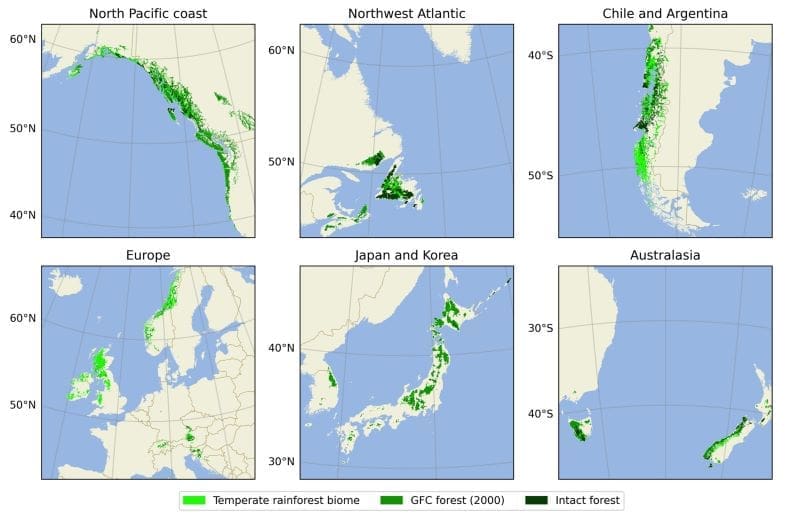The world’s temperate rainforests, rare ecosystems found only in cool, moist climates, are facing unprecedented threats from climate change, according to new research by scientists at the University of Leeds.
Published in Earth’s Future, the study estimates that if current climate trends continue, up to two-thirds of these unique forests could disappear by the end of the century.
The study, the first global analysis of climate change’s impacts on temperate rainforests, mapped existing forest cover, forest health, and climate patterns to assess both human-driven damage and projected climate impacts on these forests.
Under the most pessimistic projections, 68% of temperate rainforests worldwide would be lost. Even under existing commitments to limit fossil fuel emissions, the study warns that 23% of these forests are likely to vanish. Yet, with urgent reductions in emissions, the researchers estimate this figure could be limited to around 9%.

“Unmitigated climate change is a disaster for temperate rainforests in the UK and globally,” said Ben Silver, the study’s lead author and a research fellow at the University of Leeds’ School of Earth and Environment. “They cannot survive the kinds of high summer temperatures which we are starting to observe more regularly and are only predicted to worsen in future climate change simulations. Our study also shows that if we work hard to slow climate change it is not too late to save the world’s temperate rainforests.”
Countries that contain temperate rainforests include the United States, Canada, Chile, Australia, New Zealand, Japan, and the United Kingdom. Though these forests cover less than 1% of the Earth’s land area, they play a globally significant role in carbon storage. “Intact temperate rainforests have higher carbon density than forests in other latitudes,” the researchers noted, underscoring their importance in global carbon cycles.
In the United Kingdom, temperate rainforests are found along the western coastlines of Scotland, Northern Ireland, and England. These areas include the high-humidity, temperate zones of West Scotland, North and West Wales, Cumbria, and parts of Devon and Cornwall. Known for their high biodiversity, these forests are home to species like moisture-loving lichens, bryophytes, and liverworts, flourishing in the cool and wet conditions.
The UK’s temperate rainforests now cover less than 1% of its land area, but recent government initiatives in England and Scotland have set new targets to restore them. The study emphasizes that the UK, which hosts nearly a quarter of the world’s unforested temperate rainforest climate zone, has immense potential for restoration.
Notably, it found that UK rainforests are likely to withstand low to moderate warming, suggesting that conservation and restoration efforts in these regions may still succeed if implemented promptly.
“The UK could and should be a global leader in restoration of temperate rainforests,” said Professor Dominick Spracklen, a co-author of the study. “New funding and bold action by large landowners are urgently needed to help deliver government targets for temperate rainforest restoration.”
The study also brought in perspectives from international experts. Dr. Dominick A. DellaSala, Chief Scientist of the U.S.-based group Wild Heritage and a co-author of the research, highlighted the role of temperate rainforests in global ecological health: “All the world’s rainforests are the ‘lungs of the planet’ that must be protected and restored as natural climate solutions to avoid the worst of global overheating. Temperate rainforests need to take their place alongside tropical rainforests and the boreal forests of the north as strategically vital to a safe climate.”
The study adds to a growing body of evidence pointing to the urgency of conserving and restoring these critical ecosystems as part of a broader strategy to mitigate climate change. Scientists and environmental advocates agree that saving these rainforests requires immediate action from policymakers, conservation organizations, and the public to reduce emissions, protect vulnerable forests, and invest in restoration projects.
Journal Reference:
Ben Silver, Dominick V. Spracklen, Dominick A. DellaSala, Callum Smith, ‘Large Reductions in Temperate Rainforest Biome Due to Unmitigated Climate Change’, Earth’s Future 12 (11) e2024EF004812 (2024). DOI: 10.1029/2024EF004812
Article Source:
Press Release/Material by University of Leeds
Featured image credit: Mike Krejci




